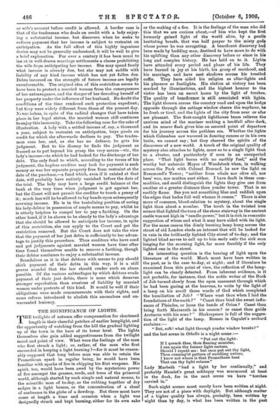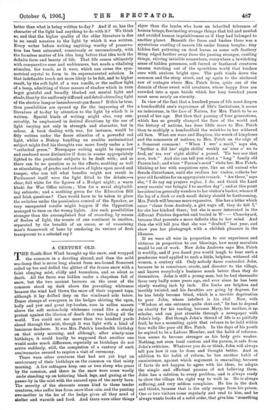THE SIGNIFICANCE OF LIGHTS.
THE twilights of autumn offer compensation for shortened length in their cheerful patches of earlier lamplight, and the opportunity of watching from the hill the gradual lighting up of the town in the haze of its lower level. The lights themselves also gain added suggestiveness from the twilight mood and point of view. What were the feelings of the man who first struck a light; or, rather, of the man who first succeeded in keeping a light burning ?—for it must be reason- ably supposed that long before man was able to retain the Promethean spark in regular being, he would have been familiar with sparks of fire in chipping his flint weapons. His spirit, too, would have been awed by the mysterious power qf fire amongst the grasses, reeds, and trees of the primeval world, although started by such simple and natural means, to the scientific man of to-day, as the rubbing together of thy sedges in a light breeze, or the concentration of a sheaf of sunbeams in the globe of a dewdrop. But there must have come at length a time and occasion when a light was designedly struck and kept burning, either for its own sake
or the making of a fire. It is the feelings of the man who did this that we are curious about,—of him who kept the first humanly gained light of the world alive, by a gentle hesitating breath, that was half prayer to the misty gag whose power be was arrogating. A beneficent discovery becl been made by budding man, destined t,o have more to do with his uplifting than any other discovery before or since in hie long and complex history. He has held on to it. Light., have attended every period and phase of his life. They have burned in joy at his birth, his grasp of manhood, arol his marriage, and have cast shadows across his trestled coffin. they have aided his religion as altar-lights and his pleasure as footlights. His elation at victory has been marked by illuminations, and the highest honour to the victor has been an escort home by the light of torches. ne quality of beneficence is still associated with lights. The light thrown across the country road and upon the hedge opposite through the cottage window cheers the wayfarer, be he fresh or tired, and the lights of the city from near or afar are pleasant. The first-caught lighthouse beam relieves the anxious mind of the mariner making a landfall after dark,
and its nearer flash gives him an assured point of departure for his journey across the pathless sea. Whether the lights which Columbus saw wavered in dancing canoes or in his own brain, we cannot say ; but they cheered the spirits of the discoverer of a new world. A touch of the original quality of mystery also attaches to lights, more so to a single light than to a cluster, and particularly if seen in an unexpected place. "That light burns with no earthly fuel," said the worthy but unheroic Mayor of Woodstock when, in walking across the Park with Colonel Everard, he saw the light on Rosamond's tower; "neither from whale nor olive oil, nor bees' wax, nor mutton suet either. I have dealt in these com- modities, and could distinguish the lights they give one from another at a greater distance than yonder tower. That is no earthly flame. See you not something blue and reddish upon the edges that bodes full well whence it comes." There is also
more of romance, blood-relation to mystery, about the single light than about a number. The torch in the twisted iron sconce that lighted the turn of the stone stairway in the ancient castle was not high in " candle-power," but it is rich in romantic suggestion of whom and what it may have aided with its light. For the same reason the dimly burning lamp hung across the street of old London sheds an interest that will be looked for in vain in the brilliantly lighted City street of to-day; and the lighted blind serves to call up to him early astir the sick man longing for the morning light, far more forcibly if the only lighted one in the street.
An interesting question is the bearing of light upon the literature of the world. Much must have been written in the past, as is the case to-day, at night; and if literature be examined from this point of view, the reflection of the lamp- light can be clearly detected. From inherent evidence, is ft not probable, for instance, that the noble writer of the Book of Job turned slowly from the open casement through which be had been gazing at the heavens, to write by the light of a lamp on his scroll those words of God which completed the humiliation of Job ? "Where want thou when I laid the foundations of the earth ?" "Canst thou bind the sweet influ- ences of Pleiades, or loose the bands of Orion ? Cana thou bring forth Mazzaroth in his season ? or canal thou guide Arcturus with his eons P" Shakespeare is full of the sugges- tion of the light of the lamp. Romeo in Capukt's orchard exclaims :— " But, soft! what light through yonder window breaks ?"
and the last scene in Othello is a night scene :—
"Put out the light: If I quench thee, thou flaming minister, I can again thy former light restore, Should I repent me : but once put out thy light, Thou cunning'st pattern of excelling nature, I know not where is that Promethean heat' That can thy light relume."
Lady Macbeth "bad a light by her continually," and probably Hamlet's great soliloquy was murmured at least in the dusk, for in the next scene we have "torches carried in."
Such night scenes must surely have been written at night. They are not of a piece with daylight. But although matter of a higher quality has always, probably, been written by night than by day, is what has been written in the past better than what is being written to-day ? And if so, has the character of the light had anything to do with it ? We think so, and that the higher quality of the older literature is due in no small measure to the light by which it was written. Every writer before writing anything worthy of preserva- tion has been saturated, consciously or unconsciously, with the formless matter of his idea long before that idea took the definite form and beauty of life. That life comes ultimately with comparative ease and suddenness, but needs a vitalising • stimulus, the touch, as it were, which can cause the gym.; metrical crystal to form in its supersaturated solution. Is that indefinable touch not more likely to be felt, and to higher result, by the soft light of a wax candle, or the mellow light of a lamp, admitting of those masses of shadow which in turn beget grateful and broadly blocked out mental light and Shade, than by the uniformly diff used and detail-obtruding light of the electric lamp or incandescent-gas flame ? If this be true, then possibilities are opened up for the improving of the literature of to-day by attention to the light by which it is written. Special kinds of writing might also, very con- ceivably, be emphasised in desired directions by the use of light varying not only in strength and character, but in colour. A book dealing with war, for instance, would be fitly written under the fierce stimulus of a powerful red light, whilst a Bishop handling an erudite ecclesiastical subject might find his thoughts run more freely under a low "cathedral green." Newspaper writing might be improved and rendered more distinctive if done in rooms appropriately lighted to the particular subjects to be dealt with; and as there can be no question as to the effects, soothing as well as stimulating, of grades and colours of lights upon mood and temper, who can tell what benefits might not result in Parliament itself were the light fitted to the debate,—a clear, full white for the figures of a Budget night ; a warm khaki for War Office reform ; blue for a naval shipbuild- ing estimate; and a soothing green for the Education Bill and Irish questions ? Care would have to be taken to place the switches under the passionless control of the Speaker, as very unexpected results might happen if the Opposition managed to turn on the wrong lights. Are such possibilities stranger than the accomplished feat of recording, by means of flashes of light, the events of one continent in another, separated by the breadth of an ocean, or of examining man's framework of bone by rendering its vesture of flesh transparent to a selected ray ?































































 Previous page
Previous page